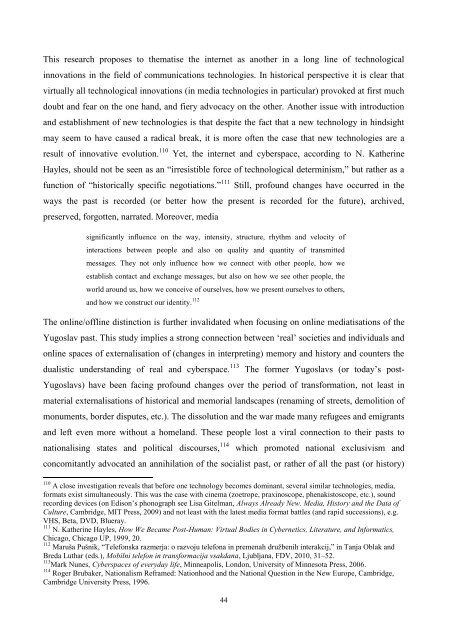UNIVERSITY OF NOVA GORICA GRADUATE SCHOOL ...
UNIVERSITY OF NOVA GORICA GRADUATE SCHOOL ...
UNIVERSITY OF NOVA GORICA GRADUATE SCHOOL ...
Create successful ePaper yourself
Turn your PDF publications into a flip-book with our unique Google optimized e-Paper software.
This research proposes to thematise the internet as another in a long line of technological<br />
innovations in the field of communications technologies. In historical perspective it is clear that<br />
virtually all technological innovations (in media technologies in particular) provoked at first much<br />
doubt and fear on the one hand, and fiery advocacy on the other. Another issue with introduction<br />
and establishment of new technologies is that despite the fact that a new technology in hindsight<br />
may seem to have caused a radical break, it is more often the case that new technologies are a<br />
result of innovative evolution. 110 Yet, the internet and cyberspace, according to N. Katherine<br />
Hayles, should not be seen as an ―irresistible force of technological determinism,‖ but rather as a<br />
function of ―historically specific negotiations.‖ 111 Still, profound changes have occurred in the<br />
ways the past is recorded (or better how the present is recorded for the future), archived,<br />
preserved, forgotten, narrated. Moreover, media<br />
significantly influence on the way, intensity, structure, rhythm and velocity of<br />
interactions between people and also on quality and quantity of transmitted<br />
messages. They not only influence how we connect with other people, how we<br />
establish contact and exchange messages, but also on how we see other people, the<br />
world around us, how we conceive of ourselves, how we present ourselves to others,<br />
and how we construct our identity. 112<br />
The online/offline distinction is further invalidated when focusing on online mediatisations of the<br />
Yugoslav past. This study implies a strong connection between ‗real‘ societies and individuals and<br />
online spaces of externalisation of (changes in interpreting) memory and history and counters the<br />
dualistic understanding of real and cyberspace. 113<br />
44<br />
The former Yugoslavs (or today‘s post-<br />
Yugoslavs) have been facing profound changes over the period of transformation, not least in<br />
material externalisations of historical and memorial landscapes (renaming of streets, demolition of<br />
monuments, border disputes, etc.). The dissolution and the war made many refugees and emigrants<br />
and left even more without a homeland. These people lost a viral connection to their pasts to<br />
nationalising states and political discourses, 114<br />
which promoted national exclusivism and<br />
concomitantly advocated an annihilation of the socialist past, or rather of all the past (or history)<br />
110 A close investigation reveals that before one technology becomes dominant, several similar technologies, media,<br />
formats exist simultaneously. This was the case with cinema (zoetrope, praxinoscope, phenakistoscope, etc.), sound<br />
recording devices (on Edison‘s phonograph see Lisa Gitelman, Always Already New. Media, History and the Data of<br />
Culture, Cambridge, MIT Press, 2009) and not least with the latest media format battles (and rapid successions), e.g.<br />
VHS, Beta, DVD, Blueray.<br />
111 N. Katherine Hayles, How We Became Post-Human: Virtual Bodies in Cybernetics, Literature, and Informatics,<br />
Chicago, Chicago UP, 1999, 20.<br />
112 Maruša Pušnik, ―Telefonska razmerja: o razvoju telefona in premenah druţbenih interakcij,‖ in Tanja Oblak and<br />
Breda Luthar (eds.), Mobilni telefon in transformacija vsakdana, Ljubljana, FDV, 2010, 31–52.<br />
113 Mark Nunes, Cyberspaces of everyday life, Minneapolis, London, University of Minnesota Press, 2006.<br />
114 Roger Brubaker, Nationalism Reframed: Nationhood and the National Question in the New Europe, Cambridge,<br />
Cambridge University Press, 1996.

















